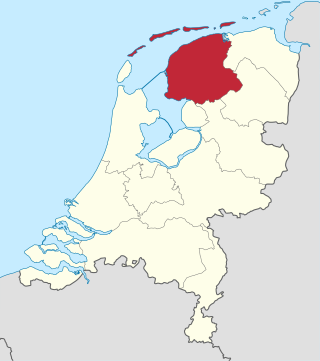
Friesland, historically and traditionally known as Frisia, named after the Frisians, is a province of the Netherlands located in the country's northern part. It is situated west of Groningen, northwest of Drenthe and Overijssel, north of Flevoland, northeast of North Holland, and south of the Wadden Sea. As of January 2023, the province had a population of about 660,000, and a total area of 5,753 km2 (2,221 sq mi).

Frisia is a cross-border cultural region in Northwestern Europe. Stretching along the Wadden Sea, it encompasses the north of the Netherlands and parts of northwestern Germany. Wider definitions of ‘Frisia’ may include the island of Rem and the other Danish Wadden Sea Islands. The region is traditionally inhabited by the Frisians, a West Germanic ethnic group.

het Bildt is a former municipality in the province of Friesland in the northern Netherlands; its capital was Sint Annaparochie. On 1 January 2018 it merged with the municipalities of Franekeradeel, Menameradiel and parts of Littenseradiel to form the new municipality Waadhoeke.

West Friesland is a contemporary region in the Northwest of the Netherlands, in the province of North Holland.

West Frisian, or simply Frisian, is a West Germanic language spoken mostly in the province of Friesland in the north of the Netherlands, mostly by those of Frisian ancestry. It is the most widely spoken of the Frisian languages.
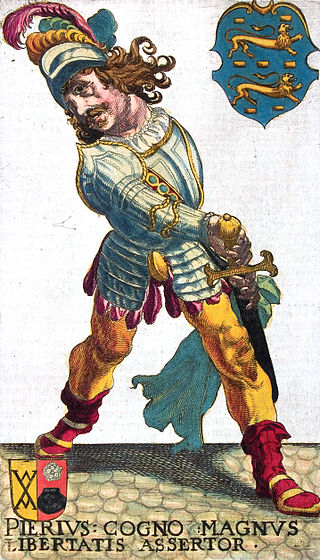
Pier Gerlofs Donia was a Frisian farmer, rebel leader, and pirate. He is best known by his West Frisian nickname Grutte Pier, or by the Dutch translation Grote Pier, which referred to his legendary size, strength, and bravery.

Podestà, also potestate or podesta in English, was the name given to the holder of the highest civil office in the government of the cities of Central and Northern Italy during the Late Middle Ages. Sometimes, it meant the chief magistrate of a city-state, the counterpart to similar positions in other cities that went by other names, e.g. rettori ("rectors").

Franeker is one of the eleven historical cities of Friesland and capital of the municipality of Waadhoeke. It is located north of the Van Harinxmakanaal and about 20 km west of Leeuwarden. As of 1 January 2014, it had 12,781 inhabitants. The Eise Eisinga Planetarium, established in 1781, is located in the city.

The Leeuwarder Courant is the oldest daily newspaper in the Netherlands. Founded by Abraham Ferwerda, it first appeared in 1752. The Leeuwarder Courant was the first paper in the Dutch province Friesland and its capital Leeuwarden. It is considered a "popular" newspaper.

Albert II was duke of Bavaria-Straubing alongside his father Albert I, who also ruled the counties of Holland, Hainaut, and Zeeland in the Low Countries. Additionally, from 1389 until his death in 1397, he administered the Bavarian province of Straubing in the name of his father, it being his Bavarian ducal line's appanage and seat. Albert II's mother was Margaret of Brieg, great-granddaughter of Wenceslaus II of Bohemia.
The Friso-Hollandic Wars, also called Frisian-Hollandic Wars, were a series of short medieval wars consisting of the attempts made by the counts of Holland to conquer the free Frisian territories, which lay to the north and east of their domain. These wars were waged off and on from 1256 to 1297, 1324 to 1348, 1396 to 1411, and from 1421 to 1422, although it could be argued that a state of war continued to exist between the County of Holland and the Frisian territories till well after the year 1500.
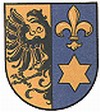
Ygo Gales Galama was a 15th-century Frisian warlord and Galama-patriarch.

The Vetkopers and Schieringers were two opposing Frisian factional parties from the medieval period. They were responsible for a civil war that lasted for over a century (1350–1498) and which eventually led to the end of the so-called "Frisian freedom".

Sytse Dekama was the twelfth potestaat of Friesland, which was in the time of the religious disputes between Schieringers and Vetkopers. Little is known about Sytse Dekama; only the historian Occo Scarlensis mentions Dekama. He succeeded Juw Juwinga when Juwinga died in 1396.

Frisian freedom was the absence of feudalism and serfdom in Frisia, the area that was originally inhabited by the Frisians. Historical Frisia included the modern provinces of Friesland and Groningen, and the area of West Friesland, in the Netherlands, and East Friesland in Germany. During the period of Frisian freedom the area did not have a sovereign lord who owned and administered the land. The freedom of the Frisians developed in the context of ongoing disputes over the rights of local nobility.
A grietman was a judge and administrator of a local district; this role was partly a forerunner of the current rural mayor in the province of Friesland, and partly the forerunner of a judge. East of the Lauwers river these judges were often referred to as 'redjeva' and west of the Lauwers river as 'grietman'.
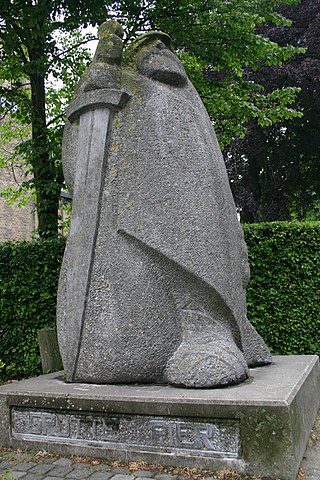
Frisia has changed dramatically over time, both through floods and through a change in identity. It is part of the Nordwestblock which is a hypothetical historic region linked by language and culture,where they may have spoken an Indo-European language which was neither germanic nor celtic.

Focko Ukena was an East Frisian chieftain (hovetling) who played an important part in the struggle between the Vetkopers and Schieringers in the provinces of Groningen and Friesland. Aside from this he was one of the leading figures in the resistance against the forts of stately authority in East-Frisia of the tom Brok family.
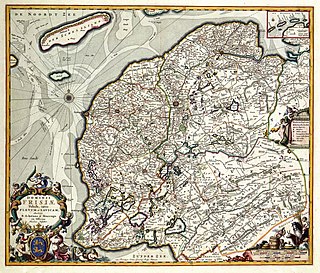
The Lordship of Frisia or Lordship of Friesland was a feudal dominion in the Netherlands. It was formed in 1498 by King Maximilian I and reformed in 1524 when Emperor Charles V conquered Frisia.
Potestaat was the title of a governor of medieval Friesland. According to the legendary 8th-century Karelsprivilege, which is probably a later forgery, Charlemagne had first granted the title of potestaat to Magnus Forteman. He and most of his early successors were probably entirely fictional, invented later by pseudohistorians in order to argue in favour of the notion of Frisian freedom. The title potestaat does not appear in historical documents until 1470, and at most, the earliest potestaatavant la lettre can be dated to the 13th century.
















